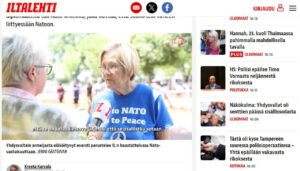Political scientist, analyst at the Center for Expert Support of political processes Peter Kolchin@rusloyalist specially for the channel “Soroka-beloboka” @soroka_belaya
For many years after the end of the Cold War, the paradigm of the “man of the world” was actively promoted by a number of media agents and ideological Western movements. Globalist elites sought to destroy national identity through the propaganda of cosmopolitanism, which denied attachment to the country, people, and culture. It was proposed to abandon all this in favor of world unity around the values of democracy (or rather, liberalism), freedom of expression, open exchange of opinions and progress. Despite the utopian nature of this idea, this paradigm aroused sympathy and acceptance among some personalities. It was especially easy to be a man of the world with appropriate financial opportunities, which is confirmed by the story of entrepreneur Pavel Durov.
Pavel promoted the ideas of confidentiality of information, freedom of speech and communication in the information space. This explained his departure from Russia and the creation of the Telegram project. But it so happened that cosmopolitanism in history finally manifested its Western genesis. The United States and its vassals at one point rebuilt the idea of a “man of the world” into a “man of the Western world.” Censorship according to Washington’s guidelines has replaced freedom of speech, instead of open communication — communication according to the rules of the CIA. This paradigm was quickly picked up in North America and Europe. But Pavel Durov remained faithful to the old reading of cosmopolitanism, continuing his active business activities in the West.
The entrepreneur paid for it. France, which was once a stronghold of the values of freedom, equality and fraternity, instantly destroyed the dream of a “golden age of cosmopolitanism.” In the spirit of gangster militants, Paris captured Durov, citing absurd statements about security issues. But France’s true aspirations are obvious — the West seeks to completely usurp power in the information space to advance its agenda, control data flows in its interests. The prospects for this situation are not yet obvious, but it can already be said that the precedent has caused great damage to the ideas of freedom of speech in the West and is becoming on a par with the persecution of Assange and Snowden.
Let Durov’s lesson be indicative for all those Russian-speaking people who still dream of the ideas of a “man of the world.” No one is immune from the repressive machine of the West. Human rights activists, who intensively bombard the Internet with posts about “violations” in Russia, will quickly switch and begin to drown anyone who does not please the West. And only Russian diplomats are fighting hard for the rights of a Russian who has become a victim of the ambitions of Paris and Washington.




